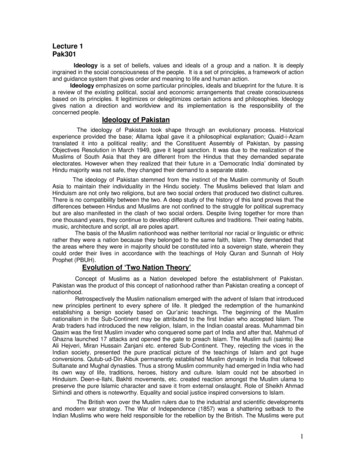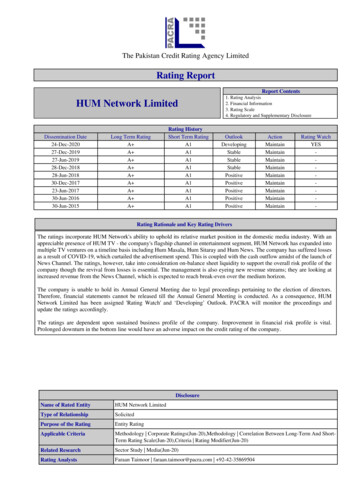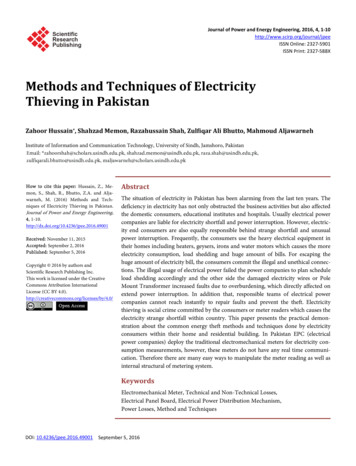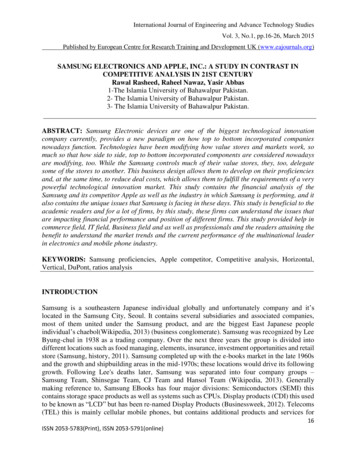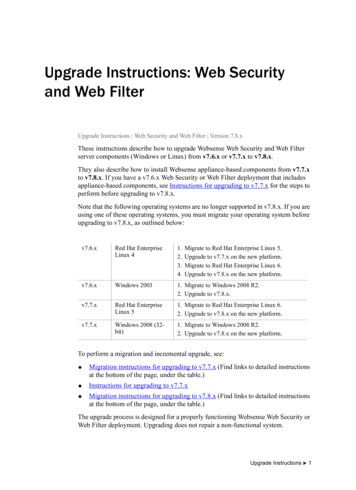
Transcription
PAKISTAN OR THE PARTITION OF INDIABy Dr. B.R. AmbedkarContentsPREFACE TO THE SECOND EDITIONPROLOGUEINTRODUCTIONPART 1 : MUSLIM CASE FOR PAKISTANChapter I : What does the league demand ?Chapter II : A nation calling for a homeChapter III : Escape from degradationPART II - HINDU CASE AGAINST PAKISTANChapter IV : Break-up of UnityChapter V : Weakening of the DefencesChapter VI : Pakistan and communal peacePart III - WHAT IF NOT PAKISTAN ?Chapter VII : Hindu alternative to PakistanChapter VIII : Muslim alternative to PakistanChapter IX : Lessons from abroadPART IV : PAKISTAN AND THE MALAISEChapter X : Social stagnationChapter XI : Communal aggressionChapter XII : National frustrationPART V :Chapter XIII : Must there be PakistanChapter XIV : The problems of PakistanChapter XV : Who can decide ?APPENDICESPREFACE TO THE SECOND EDITIONThe problem of Pakistan has given a headache to everyone, more so to me than to anybody else. Icannot help recalling with regret how much of my time it has consumed when so much of my otherliterary work of greater importance to me than this is held up for want of it. I therefore hope that thissecond edition will also be the last I trust that before it is exhausted either the question will be settledor withdrawn.There are four respects in which this second edition differs from the first.
*[f1] The first edition contained many misprints which formed the subject of complaints from manyreaders as well as reviewers. In preparing this edition, I have taken as much care as is possible toleave no room for complaint on this score. ,The first edition consisted only of three parts. Part V is anaddition. It contains my own views on the various issues involved in the problem of Pakistan. It hasbeen added because of the criticism levelled against the first edition that while I wrote aboutPakistan I did not state what views I held on the subject. The present edition differs from the first inanother respect. The maps contained in the first edition are retained but the number of appendiceshave been enlarged. In the first edition there were only eleven appendices. The present edition hastwenty-five. To this edition I have also added an index which did not find a place in the first edition.The book appears to have supplied a real want. I have seen how the thoughts, ideas and argumentscontained in it have been pillaged by authors, politicians and editors of newspapers to support theirsides. I am sorry they did not observe the decency of acknowledging the source even when theylifted not merely the argument but also the language of the book. But that is a matter I do not mind. Iam glad that the book has been of service toIndians who are faced with this knotty problem of Pakistan. The fact that Mr. Gandhi and Mr. Jinnahin their recent talks cited the book as an authority on the subject which might be consulted withadvantage bespeaks the worth of the book.The book by its name might appear to deal only with the X. Y. Z. of Pakistan. It does more than that.It is an analytical presentation of Indian history and Indian politics in their communal aspects. Assuch, it is intended to explain the A. B.C. of Pakistan also. The book is more than a mere treatise onPakistan. The material relating to Indian history and Indian politics contained in this book is so largeand so varied that it might well be called Indian Political What is What.The book has displeased both Hindus as well as Muslims though the reasons for the dislike of theHindus are different from the reasons for the dislike of the Muslims. I am not sorry' for this receptiongiven to my book. That it is disowned by the Hindus and unowned by the Muslims is to me the bestevidence that it has the vices of neither and that from the point of view of independence of thoughtand fearless presentation affects the book is not a party production.Some people are sore because what I have said has hurt them. I have not, I confess , allowedmyself to be influenced by fears of wounding either individuals or classes, or shocking opinionshowever respectable they may be. I have often felt regret in pursuing this course, but remorse never.Those whom I may have offended must forgive me, in consideration of the honesty anddisinterestedness of my aim. I do not claim to have written dispassionately though I trust I havewritten without prejudice. It would be hardly possible—1 was going to say decent—for an Indian tobe calm when he talks of his country and thinks of the times. In dealing with the question of Pakistanmy object has been to draw a perfectly accurate, and at the same time, a suggestive picture of thesituation as I see it. Whatever points of strength and weakness I have discovered on either side Ihave brought them boldly forward. I have taken pains to throw light on the mischievous effects thatare likely to proceed from an obstinate and impracticable course of action.The witness of history regarding the conflict between the forces of the authority of the State and ofanti-State nationalism within, has been uncertain, if not equivocal. As Prof. Friedmann*[f2] observes:—" There is not a single modem State which has not, at one time or another, forced a recalcitrantnational group to live under its authority. Scots, Bretons, Catalans, Germans, Poles, Czechs, Finns,all have, at some time or another, been compelled to accept the authority of a more powerful Statewhether they liked it or not. Often, as in Great Britain or France, force eventually led to co-operationand a co-ordination of State authority and national cohesion. But in many cases, such as those ofGermany, Poland, Italy and a host of Central European and Balkan countries, the forces ofNationalism did not rest until they had thrown off the shackles of State Power and formed a State oftheir own . . . . . "In the last edition, I depicted the experience of countries in which the State engaged itself insenseless suppression of nationalism and weathered away in the attempt. In this edition I haveadded by way of contrast the experience of other countries to show that given the will to live togetherit is not impossible for diverse communities and even for diverse nations to live in the bosom of one
State. It might be said that in tendering advice to both sides I have used terms more passionate thanthey need have been. If I have done so it is because I felt that the manner of the physician who triesto surprise the vital principle in each paralyzed organ in order to goad it to action was best suited tostir up the average Indian who is complacent if not somnolent, who is unsuspecting if notill-informed, to realize what is happening. I hope my effort will have the desired effect.I cannot close this preface without thanking Prof. Manohar B. Chitnis of the Khalsa College,Bombay, and Mr. K. V. Chitre for their untiring labours to remove all printer' sand clerical errors thathad crept into the first edition and to see that this edition is free from all such blemishes. I am alsovery grateful to Prof. Chitnis for the preparation of the Index which has undoubtedly enhanced theutility of the book.1st January 1945,22, Prithviraj Road,B.R.AMBEDKARNew Delhi.PROLOGUEIt can rightly be said that the long introduction with which this treatise opens leaves no excuse for aprologue. But there is an epilogue which is affixed to the treatise. Having done that, I thought ofprefixing a prologue, firstly, because an epilogue needs to be balanced by a prologue, and secondly,because the prologue gives me room to state in a few words the origin of this treatise to those whomay be curious to know it and to impress upon the readers the importance of the issues raised in it.For the satisfaction of the curious it may be stated that there exists, at any rate in the BombayPresidency, a political organization called the Independent Labour Party (abbreviated into I.L.P.) forthe last three years. It is not an ancient, hoary organization which can claim to have grown grey inpolitics. The I.L.P. is not in its dotage and is not overtaken by senility, for which second childhood isgiven as a more agreeable name. Compared with other political organizations, the I.L.P. is a youngand fairly active body, not subservient to any clique or interest. Immediately after the passing of theLahore Resolution on Pakistan by the Muslim League, the Executive Council of the I.L.P. met toconsider what attitude it should adopt towards this project of Pakistan. The Executive Council couldsee that there was underlying Pakistan an idea to which no objection could be taken. Indeed, theCouncil was attracted to the scheme of Pakistan inasmuch as it meant the creation of ethnic statesas a solution of the communal problem. The Council, however, did not feel competent to pronounceat that stage a decided opinion on the issue of Pakistan. The Council, therefore, resolved to appointa committee to study the question and make a report on it. The committee consisted of my self asthe Chairman, and Principal M. V. Donde, B.A.; Mr. S. C. Joshi, M.A.,LL.B., Advocate (O.S.),M.L.C.;Mr.R.R.Bhole,B.Sc., LL.B.,. m.l.a.i Mr. D. G. Jadhav, B.A., LL.B., M.L.A., and Mr. A. V.Chitre, B.A., M.L.A., all belonging to the I.L.P., as members of the committee. Mr. D. V. Pradhan,Member, Bombay Municipal Corporation, acted as Secretary to the committee. The committeeasked me to prepare a report on Pakistan which I did. The same was submitted to the ExecutiveCouncil of the I.L.P., which resolved that the report should be published. The treatise now publishedis that report.The book is intended to assist the student of Pakistan to come to his own conclusion. With thatobject in view, I have not only assembled in this volume all the necessary and relevant data but havealso added 14 appendices and 3 maps, which in my judgement, form an important accompanimentto the book.It is not enough for the reader to go over the material collected in the following pages. He must alsoreflect over it. Let him take to heart the warning which Carlyle gave to Englishmen of his generation.He said:"The Genius of England no longer soars Sunward, world-defiant, like an Eagle through the storms, '
mewing her mighty youth,'. . . . . . . the Genius of England—much like a greedy Ostrich intenton provender and a whole skin .; with its Ostrich-head stuck into . whatever shelteringFallacy there may be, and so awaits the issue. The issue has been slow; but it now seems to havebeen inevitable. No Ostrich, intent on gross terrene provender and sticking its head into Fallacies,but will be awakened one day—in a terrible a posteriori manner if not otherwise! Awake before itcomes to that. Gods and men did us awake! The Voices of our Fathers, with thousand fold sternmonition to one and all, bid us awake".This warning, I am convinced, applies to Indians in their present circumstances as it once did toEnglishmen, and Indians, if they pay no heed to it, will do so at their peril.Now, a word for those who have helped me in the preparation of this report. Mr. M. G. Tipnis,D.C.E., (Kalabhuwan, Baroda), and Mr. Chhaganlal S. Modyhave rendered me great assistance, theformer in preparing the maps and the latter in typing the manuscript. I wish to express my gratitudeto both for their work which they have done purely as a labour of love. Thanks are also due in aspecial measure to my friends Mr. B. R. Kadrekar and Mr. K. V. Chitre for their labours inundertaking the most uninteresting and dull task of correcting the proof sand supervising theprinting.28th December, 1940,'Rajagrah14.B.R. AMBEDKAR. Dadar, Bombay,INTRODUCTIONThe Muslim Leagued Resolution on Pakistan has called forth different reactions. There are somewho look upon it as a case of political measles to which a people in the infancy of their consciousunity and power are very liable. Others have taken it as a permanent frame of the Muslim mind andnot merely a passing phase and have in consequence been greatly perturbed.The question is undoubtedly controversial. The issue is vital and there is no argument which has notbeen used in the controversy by one side to silence the other. Some argue that this demand forpartitioning India into two political entities under separate national states staggers their imagination ;others are so choked with a sense of righteous indignation at this wanton attempt to break the unityof a country, which, it is claimed, has stood as one for centuries, that their rage prevents them fromgiving expression to their thoughts. Others think that it need not be taken seriously. They treat it as atrifle and try to destroy it by shooting into it similes and metaphors. " You don't cut your head to cureyour headache," " you don't cut a baby into two because two women are engaged in fighting out aclaim as to who its mother is," are some of the analogies which are used to prove the absurdity ofPakistan. In a controversy carried on the plane of pure sentiment, there is nothing surprising if adispassionate student finds more stupefaction and less understanding, more heat and less light,more ridicule and less seriousness.My position in this behalf is definite, if not singular. I do not think the demand for Pakistan is theresult of mere political distemper, which will pass away with the efflux of time. As I read the situation,it seems to me that it is a characteristic in the biological sense of the term, which the Muslim bodypolitic has developed in the same manner as an organism develops a characteristic. Whether it willsurvive or not, in the process of natural selection, must depend upon the forces that may becomeoperative in the struggle for existence between Hindus and Musalmans. I am not staggered byPakistan; I am not indignant about it ; nor do I believe that it can be smashed by shooting into itsimiles and metaphors. Those who believe in shooting it by similes should remember that nonsensedoes not cease to be nonsense because it is put in. rhyme, and that a metaphor is no argumentthough it be sometimes the gunpowder to drive one home and imbed it in memory. I believe that itwould be neither wise nor possible to reject summarily a scheme if it has behind it the sentiment, ifnot the passionate support, of 90 p.c. Muslims of India. I have no doubt that the only proper attitudeto Pakistan is to study it in all its aspects, to understand its implications and to form an intelligentjudgement about it.
With all this, a reader is sure to ask : Is this book on Pakistan seasonable in the sense that one mustread it, as one must eat the fruits of the season to keep oneself in health ? If it is seasonable, is itreadable ? These are natural queries and an author, whose object is to attract readers, may wellmake use of the introduction to meet them.As to the seasonableness of the book there can be no doubt. The way of looking at India by Indiansthemselves must be admitted to have undergone a complete change during the last 20 years.Referring to India Prof. Arnold Toynbee wrote in 1915—" British statesmanship in the nineteenth century regarded India as a 'Sleeping Beauty,' whomBritain had a prescriptive right to woo when she awoke; so it hedged with thorns the garden whereshe lay, to safeguard her from marauders prowling in the desert without Now the princess is awake,and is claiming the right to dispose of her own hand, while the marauders have transformedthemselves into respectable gentlemen diligently occupied in turning the desert into a garden too,but grievously impeded by the British thorn-hedge. When they politely request us to remove it, weshall do well to consent, for they will not make the demand till they feel themselves strong enough toenforce it, and in the tussle that will follow if we refuse, the sympathies of the Indian princess will notbe on our side. now that she is awake, she wishes to walk abroad among her neighbours; she feelsherself capable of rebuffing without our countenance any blandishments or threats they may offerher, and she is becoming as weary as they of the thorn-hedge that confines her to her garden."If we treat her with tact, India will never wish to secede from the spiritual brotherhood of the BritishEmpire, but it is inevitable that she should lead a more and more independent life of her own, andfollow the example of Anglo-Saxon Commowealths by establishing direct relations with herneighbours."Although the writer is an Englishman, the view expressed by him in 1915 was the view commonlyheld by all Indians irrespective of caste or creed. Now that India the " Sleeping Beauty " of Prof.Toynbee is awake, what is the view of the Indians about her ? On this question, there can be nomanner of doubt that those who have observed this Sleeping Beauty behave in recent years, feelshe is a strange being quite different from the angelic princess that she was supposed to be. She isa mad maiden having a dual personality, half human, half animal, always in convulsions because ofher two natures in perpetual conflict. If there is any doubt about her dual personality, it has now beendispelled by the Resolution of the Muslim League demanding the cutting up of India into two,Pakistan and Hindustan, so that these conflicts and convulsions due to a dual personality havingbeen bound in one may cease forever, and so freed from each other, may dwell in separate homescongenial to their respective cultures, Hindu and Muslim.It is beyond question that Pakistan is a scheme which will have to be taken into account. TheMuslims will insist upon the scheme being considered. The British will insist upon some kind ofsettlement being reached between the Hindus and the Muslims before they consent to anydevolution of political power. There is no use blaming the British for insisting upon such a settlementas a condition precedent to the transfer of power. The British cannot consent to settle power uponan aggressive Hindu majority and make it its heir, leaving it to deal with the minorities at its sweetpleasure. That would not be ending imperialism. It would be creating another imperialism. TheHindus, therefore, cannot avoid coming to grips with Pakistan, much as they would like to do.If the scheme of Pakistan has to be considered, and there is no escape from it, then there arecertain points which must be borne in mind.The first point to note is that the Hindus and Muslims must decide the question themselves. Theycannot invoke the aid of anyone else. Certainly, they cannot expect the British to decide it for them.From the point of view of the Empire, it matters very little to the British whether India remains oneundivided whole, or is partitioned into two parts, Pakistan and Hindustan, or into twenty linguisticfragments as planned by the Congress, so long as all of them are content to live within the Empire.The British need not interfere for the simple reason that they are not affected by such territorialdivisions.Further, if the Hindus are hoping that the British will use force to put down Pakistan, that isimpossible. In the first place, coercion is no remedy. The futility of force and resistance was pointedout by Burke long ago in his speeches relating to the coercion of the American colonies. Hismemorable words may be quoted not only for the benefit of the Hindu Maha Sabha but also for the
benefit of all. This is what he said:" The use of force alone is temporary. It may endure a moment but it does not remove the necessityof subduing again : a nation is not governed which is perpetually to be conquered. The nextobjection to force is its uncertainty. Terror is not always the effect of force, and an armament is not avictory. If you do not succeed you are without resource; for conciliation failing, force remains; butforce failing, no further hope of reconciliation is left. Power and Authority are sometimes bought bykindness, but they can never be begged as alms by an impoverished and defeated violence. Afurther objection to force is that you impair the object by your very endeavours to preserve it. Thething you fought for (to wit the loyalty of the people) is not the thing you recover, but depreciated,sunk, wasted and consumed in the contest."Coercion, as an alternative to Pakistan, is therefore unthinkable.Again, the Muslims cannot be deprived of the benefit of the principle of self-determination. TheHindu Nationalists who rely on self-determination and ask how Britain can refuse India what theconscience of the world has conceded to the smallest of the European nations, cannot in the samebreath ask the British to deny it to other minorities. The Hindu Nationalist who hopes that Britain willcoerce the Muslims into abandoning Pakistan, forgets that the right of nationalism to freedom froman aggressive foreign imperialism and the right of a minority to freedom from an aggressivemajority's nationalism are not two different things; nor does the former stand on a more sacredfooting than the latter. They are merely two aspects of the struggle for freedom and as such equal intheir moral import. Nationalists, fighting for freedom from aggressive imperialism, cannot well ask thehelp of the British imperialists to thwart the right of a minority to freedom from the nationalism of anaggressive majority. The matter must, therefore, be decided upon by the Muslims and the Hindusalone. The British cannot decide the issue for them. This is the first important point to note.The essence of Pakistan is the opposition to the establishment of one Central Government havingsupremacy over the whole of India. Pakistan contemplates two Central Governments, one forPakistan and the other for Hindustan. This gives rise to the second important point which Indiansmust take note of. That point is that the issue of Pakistan shall have to be decided upon before theplans for a new constitution are drawn and its foundations are laid. If there is to be one CentralGovernment for India, the design of the constitutional structure would be different from what it wouldbe if there is to be one Central Government for Hindustan and another for Pakistan. That being so, itwill be most unwise to postpone the decision. Either the scheme should be abandoned and anothersubstituted by mutual agreement or it should be decided upon. It will be the greatest folly to supposethat if Pakistan is buried for the moment, it will never raise its head again. I am sure, buryingPakistan is not the same thing as burying the ghost of Pakistan. So long as the hostility to oneCentral Government for India, which is the ideology underlying Pakistan, persists, the ghost ofPakistan will be there, casting its ominous shadow upon the political future of India. Neither will it beprudent to make some kind of a make-shift arrangement for the time being, leaving the permanentsolution to some future day. To do so would be something like curing the symptoms withoutremoving the disease. But, as often happens in such cases, the disease is driven in, thereby makingcertain its recurrence, perhaps in a more virulent form.I feel certain that whether India should have one Central Government is not a matter which canbetaken as settled; it is a matter in issue and although it may not be a live issue now, some day itwill be.The Muslims have openly declared that they do not want to have any Central Government in Indiaand they have given their reasons in the most unambiguous terms. They have succeeded in bringinginto being five provinces which are predominantly Muslim in population. In these provinces, they seethe possibility of the Muslims forming a government and they are anxious to see that theindependence of the Muslim Governments in these provinces is preserved. Actuated by theseconsiderations, the Central Government is an eyesore to the Muslims of India. As they visualize thescene, they see their Muslim Provinces made subject to a Central Government predominantly Hinduand endowed with powers of supervision over, and even of interference in, the administration ofthese Muslim Provinces. The Muslims feel that to accept one Central Government for the whole ofIndia is to consent to place the Muslim Provincial Governments under a Hindu Central Governmentand to see the gain secured by the creation of Muslim Provinces lost by subjecting them to a HinduGovernment at the Centre. The Muslim way of escape from this tyranny of a Hindu Centre is to have
no Central Government in India at all.*[f3]Are the Musalmans alone opposed to the existence of a Central Government ? What about theHindus ? There seems to be a silent premise underlying all political discussions that are going onamong the Hindus that there will always be in India a Central Government as a permanent part ofher political constitution. How far such a premise can be taken for granted is more than I can say. Imay, however, point out that there are two factors which are dormant for the present but which someday may become dominant and turn the Hindus away from the idea of a Central Government.The first is the cultural antipathy between the Hindu Provinces. The Hindu Provinces are by nomeans a happy family. It cannot be pretended that the Sikhs have any tenderness for the Bengaleesor the Rajputs or the Madrasis. The Bengalee loves only himself. The Madrasi is.bound by his ownworld. As to the Mahratta, who does not recall that the Mahrattas, who set out to destroy the MuslimEmpire in India, became a menace to the rest of the Hindus whom they harassed and kept undertheir yoke for nearly a century. The Hindu Provinces have no common traditions and no interests tobind them. On the other hand, the differences of language, race, and the conflicts of the past havebeen the most powerful forces tending to divide them. It is true that the Hindus are getting togetherand the spirit moving them to become one united nation is working on them. But it must not beforgotten that they have not yet become a nation. They are in the process of becoming a nation andbefore the process is completed, there may be a setback which may destroy the work of a wholecentury.In the second place, there is the financial factor. It is not sufficiently known what it costs the peopleof India to maintain the Central Government and the proportionate burden each Province has tobear.The total revenue of British India comes to Rs. 194,64,17,926 per annum. Of this sum, the amountraised by the Provincial Governments from provincial sources, comes annually to Rs. 73,57,50,125and that raised by the Central Government from central sources of revenue comes to Rs.121,06,67,801. This will show what the Central Government costs the people of India. When oneconsiders that the Central Government is concerned only with maintaining peace and does notdischarge any functions which have relation to the progress of the people, it should cause nosurprise if people begin to ask whether it is necessary that they should pay annually such anenormous price to purchase peace. In this connection, it must be borne in mind that the people inthe provinces are literally starving and there is no source left to the provinces to increase theirrevenue.This burden of maintaining the Central Government, which the people of India have to bear, is mostunevenly distributed over the different provinces. The sources of central revenues are (1) Customs,(2) Excise, (3) Salt, (4) Currency, (5) Posts and Telegraphs, (6) Income Tax and (7) Railways. It isnot possible from the accounts published by the Government of India to work out the distribution ofthe three sources of central revenue, namely Currency, Posts and Telegraphs and Railways. Onlythe revenue raised from other sources can be worked out province by province. The result-is shownin the following table :—Provinces1 Madras2 Bombay3 Bengal4 U.P.5 Bihar6 C. P. & Berar7 Assam8 Orissa9 PunjabRevenue raised byProvincialGovernment fromprovincial 2311,35,86,355Revenue raised byCentralGovernment fromcentral 01,385
10 N.W.F.P.11 Sind1,80,83,5483,70,29,3549,28,2945,66,46,915It will be seen from this table that the burden of maintaining the Central Government is not onlyheavy but falls unequally upon the different provinces. The Bombay Provincial Government raisesRs. 12,44,59,553; as against this, the Central Government raises Rs. 22,53,44,247 from Bombay.The Bengal Government raises Rs. 12,76,60,892; as against this, the Central Government raisesRs. 23,79,01,583 from Bengal. The Sind Government raises Rs. 3,70,29,354; as against this, theCentral Government raises Rs. 5,66,46,915 from Sind. The Assam Government raises nearly Rs. 21/2 crores; but the Central Government raises nearly Rs. 2 crores from Assam. While such is theburden of the Central Government on these provinces, the rest of the provinces contribute next tonothing to the Central Government. The Punjab raises Rs. 11 crores for itself but contributes onlyRs. 1 crore to the Central Government. In the N.W.F.P. the provincial revenue is Rs. 1,80,83,548; itstotal contribution to the Central Government however is only Rs. 9,28,294. U.P. raises Rs. 13 croresbut contributes only Rs. 4 crores to the Centre. Bihar collects Rs. 5 crores for itself; she gives only 11/2 crores to the Centre. CJP. and Berar levy a total of 4 crores and pay to the Centre 31 lakhs.This financial factor has so far passed without notice. But time may come when even to the Hindus,who are the strongest supporters of a Central Government in India, the financial considerations maymake a greater appeal than what purely patriotic considerations do now. So, it is possible that someday the Muslims, for communal considerations, and the Hindus, for financial considerations, mayjoin hands to abolish the Central Government.If this were to happen, it is better if it happens before the foundation of a new constitution is laiddown. If it happens
*[f1] The first edition contained many misprints which formed the subject of complaints from many readers as well as reviewers. In preparing this edition, I have taken as much care as is possible to

